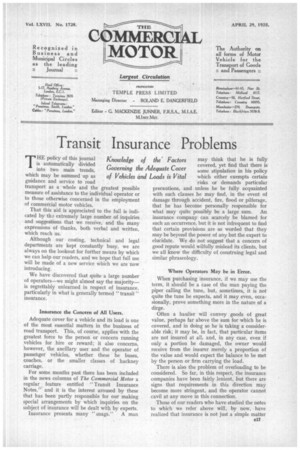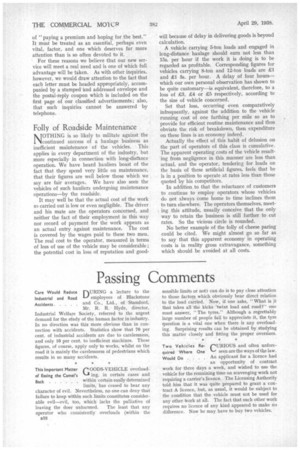Transit Insurance Problems
Page 27

Page 28

If you've noticed an error in this article please click here to report it so we can fix it.
THE policy of this journal is automatically divided into two main trends, which may be summed up as guidance and service to road transport as a whole and the greatest possible measure of assistance to the individual operator or to those otherwise concerned in the employment of commercial motor vehicles.
That this aid is appreciated to the full is indicated by ths extremely large number of inquiries and suggestions that we receive, and the many expressions of thanks, both verbal and written, which reach us.
Although our costing, technical and legal departments are kept constantly busy, we are always on the lookout for further means by which we can help our readers, and we hope that fun use will be made of a new service which we are now introducing.
We have discovered that quite a large number of operators—we might almost say the majority— is regrettably unlearned in respect of insurance, particularly in what is generally termed " transit " insurance.
Insurance the Concern of All Users.
Adequate cover for a vehicle and its load is one of the most essential matters in the business of road transport. This, of course, applies with the greatest force to the person or concern running vehicles for hire or reward; it also concerns, however, the ancillary user and the operator of passenger vehicles, whether these be buses, coaches, or the smaller classes of hackney carriage.
For some months past there has been included in the news columns of The Commercial Motor a regular feature entitled "Transit Insurance Notes," and it is the interest aroused by these that has been partly responsible for our making special arrangements by which inquiries on the subject of insurance will be dealt with by experts.
Insurance presents many "snags." A man may think that he is fully covered, yet find that there is some stipulation in his policy which either exempts certain risks or demands particular precautions, and unless he be fully acquainted with such clauses he may find, in the event of damage through accident, fire, flood or pilferage, that he has become personally responsible for what may quite possibly be a large sum. An insurance company can scarcely be blamed for such an occurrence, but it is not infrequent to find that certain provisions are so worded that they may be beyond the power of any but the expert to elucidate. We do not suggest that a concern of good repute would wilfully mislead its clients, but we all know the difficulty of construing legal and similar phraseology.
Where Operators May be in Error.
When purchasing insurance, if we may use the term, it should be a case of the man paying the piper calling the tune, but, sometimes, it is not quite the tune he expects, and it may even, occasionally, prove something more in the nature of a dirge.
Often a haulier will convey goods of great value, perhaps far above the sum for which he is covered, and in doing so he is taking a considerable risk; it may be, in fact, that particular items are not insured at all, and, in any case, even if only a portion be damaged, the owner would receive from the insurer merely a proportion of the value and would expect the balance to be met by the person or firm carrying the load.
There is also the problem of overloading to be considered. So far, in this respect, the insurance companies have been fairly lenient, but there are signs that requirements in this direction may become more stringent, and the operator cannot cavil at any move in this connection.
Those of our readers who have studied the notes to which we refer above will, by now, have realized that insurance is not just a simple matter of "paying a premium and hoping for the best." It must be treated as an essential, perhaps even vital, factor, and one which deserves far more attention than is so often devoted to it. For these reasons we believe that our new service will meet a real need and is one of which full advantage will be taken. As with other inquiries, however, we would draw attention to the fact that each letter must be headed appropriately, accompanied by a stamped and addressed envelope and the postal-reply coupon which is included on the first page of our classified advertisements; also, that such inquiries cannot be answered by telephone.
Folly of Roadside Maintenance NOTHING is so likely to militate against the continued success of a haulage business as inefficient maintenance of the vehicles. This applies in every department of the industry, but more especially in connection with long-distance operation. We have heard hauliers boast of the fact that they spend very little on maintenance, that their figures are well below those which we say are fair averages. We have also seen the vehicles of such hauliers undergoing maintenance operations—by the roadside. It may well be that the actual cost of the work so carried out is low or even negligible. The driver and his mate are the operators concerned, and neither the fact of their employment in this way nor record of payment for the work appears as an actual entry against maintenance. The cost is covered by the wages paid to these two men. The real cost to the operator, measured in terms of loss of use of the vehicle may be considerable; the potential cost in loss of reputation and good will because of delay in delivering goods is beyond calculation. A vehicle carrying 5-ton loads and engaged in long-distance haulage should earn 'not less than 15s. per hour if the work it is doing is to be regarded as profitable. Corresponding figures for vehicles carrying 8-ton and 12-ton loads are 21 and 21 5s. per hour. A delay of four hours— which our own personal observation has shown to be quite customary—is equivalent, therefore, to a loss of 23, 24 or 25 respectively, according to the size of vehicle concerned. Set that loss, occurring even comparatively infrequently, against the addition to the vehicle running cost of one farthing per mile so as to provide for efficient routine maintenance and thus obviate the risk of breakdown, then expenditure on these lines is an economy indeed. Actually the effect of this habit of delusion on the part of operators of this class is cumulative. The apparent operating costs of the vehicle resulting from negligence in this manner are less than actual, and the operator, tendering for loads on the basis of these artificial figures, feels that he is in a position to operate at rates less than those quoted by his competitors. In addition to that the reluctance of customers to continue to employ operators whose vehicles do not always come home to time inclines them to turn elsewhere. The operators themselves, meeting this attitude, usually conceive that the only way to retain the business is still further to cut rates. So the vicious circle is rounded. No better example of the folly of cheese paring could be cited. We might almost go so far as to say that this apparent economy in operating costs is in reality gross extravagance, something which should be avoided at all costs.






















































































